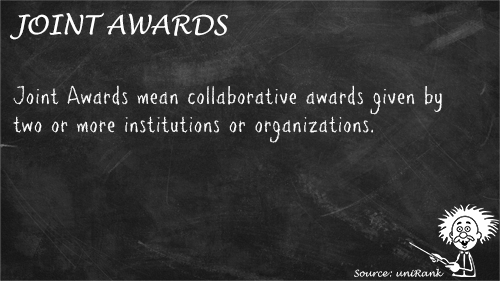
Joint Awards
What does the academic term Joint Awards mean in higher education?
Joint Awards

Short Definition
Joint Awards mean collaborative awards given by two or more institutions or organizations.
In-depth Overview
Joint Awards
Long definition: Joint awards in higher education refer to academic qualifications or degrees that are conferred jointly by two or more educational institutions or organizations. These collaborative programs allow students to earn a single degree or qualification that reflects the expertise and resources of each participating institution. Joint awards can be offered at various levels, including undergraduate and postgraduate and often involve a formal agreement between the institutions outlining the program's structure and requirements.
Etymology: The term "joint awards" is a straightforward combination of "joint", indicating collaboration or shared effort and "awards", referring to academic qualifications or honors granted to individuals.
Synonyms or related academic terms: Collaborative Degrees, Dual Degrees, Joint Degree Programs.
Examples of Use:
- She earned a joint bachelor's degree in Business Administration from two prestigious universities.
- The joint awards program between the engineering school and the design institute offers a unique interdisciplinary learning experience.
- Many students pursue joint postgraduate degrees to gain a broader skill set and enhance their career prospects.
Translations:
Spanish: Titulaciones Conjuntas
French: Diplômes Conjoints
German: Gemeinsame Abschlüsse
Italian: Lauree Condivise
Portuguese: Diplomas Conjuntos
Japanese: 共同学位 (Kyōdō Gakui)
Chinese (Simplified): 联合学位 (Liánhé Xuéwèi)
Hindi: संयुक्त पुरस्कार (Sanyukta Puraskar)
Visitors can search for this term through the uniRank World Universities Search Engine.
unirank Glossary Classification
Miscellaneous higher education terms > University academic terms